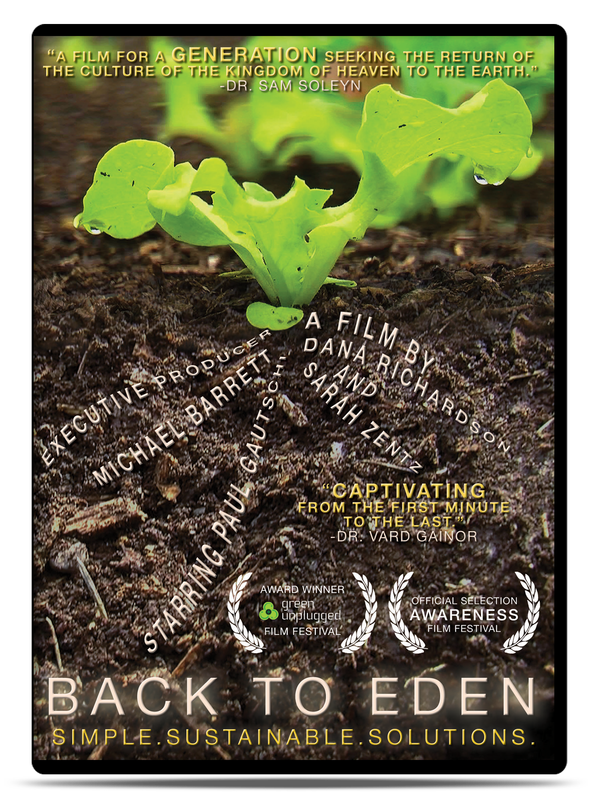|
The quick answer is yes! Wood Chip Gardening is a scientifically proven effective gardening method. In fact, there was a study comparing 15 different organic mulches which concluded wood chips are one of the best mulches for holding moisture, moderating soil temperatures, controlling weeds, and overall sustainability. The fact is wood chips absorb and retain more water than any other mulch! This water cools the soil and is slowly released to plants. Soil moisture and soil temperature is directly related to the yield from plants grown in your vegetable garden.
Myths About Wood Chip Mulch
Myth #1: Wood chips will rob nitrogen from the soil.
The biggest and most widespread myth about wood chips is that they rob nitrogen from the soil. Scientifically, there is no evidence that wood chips deplete nitrogen from the soil. As Paul Gautschi mentions in the documentary, BACK TO EDEN, this myth can be debunked by simply looking at the soil in a forest floor, where dead wood, needles, leaves, and undergrowth are all present and yet new growth is always happening. What studies do show is that where wood chips are sitting on top of the soil, such as the no-till Back to Eden Gardening method, bacteria is actively working to decompose the wood -- bacteria which then consume nitrogen as food. However, this only occurs to a depth of approximately 5mm below the wood chips. This shows that "nitrogen loss" is limited to such a small area that wood chips do not rob nitrogen from soil or plants. Actually, many studies have demonstrated that wood chip mulch materials increase nutrient levels in soils and plants. Before applying wood chips, create a thin underlying layer of a compost if there are concerns about nutrient deficiencies. This mimics what you would see in nature. It’s not required, though, and over time a wood chip mulch will develop this same structure as the lower layers break down and decompose into compost. Myth #2: Wood chips will kill your plants. What type of wood chips you use in your garden does matter! It is incredibly import that you are 100% aware of what tree(s) are in your wood chips. Before wood chips are delivered to your property, make sure you inquire about what type of wood chips are being delivered. Tell the arborist or tree service company you are using them in a vegetable garden. Why? Allelopathy is the chemical inhibition of one plant by another due to the release into the environment of substances acting as germination or growth inhibitors. For example, Reformation Acres, shares that wood chips from black walnut trees affected her tomato plants. Black Walnut wood chips have been confirmed by science to contain a chemical that inhibits plant growth. Paul Gautschi had a negative experience with Eucalyptus tree wood chip mulch which inhibited the growth of plants. Make sure you do research about the trees that grow in your local area. If you are certain about what trees are in your wood chip mulch, plants will not be killed through the leaching of allopathic chemicals in wood chips. NOTE: When you are signing up for a free delivery of wood chips, the Chip Drop app has a place for your to make special requests to your tree service company. Please, make a note if you have any specific requests about what wood chips from trees you are interested in receiving. For example, write, "No Black Walnut. No Eucalyptus." Myth #3: Wood chips acidify soils. When we refer to "wood chips" we mean tree trimmings that are composed of 90% needles, leaves, and branches that have been chipped up in a wood chipper. It is important to understand that leaves are a source of nitrogen and branches are a source of carbon. This ratio of wood chips composed of needles, leaves, and branches creates an ideal mulch for a vegetable garden once they are composted. What studies do show is that when you do not use this nitrogen to carbon ratio, mulch can increase soil acidity over time. For example, if you use 100% bark, 100% needles, or 100% leaves you are not mulching properly. However, it is difficult to significantly alter soil pH without the additions of chemicals. Changes in pH may be found in the decomposing layer of mulch but these have little effect on underlying soils. Myth #4: Wood chips increase pests such as ants, slugs, termites, etc. The top question we get asked is, "Do wood chips attract termites and pest to your garden?" The first thing to address is that wood chips do not bring pests to your property that are not already present. Paul Gautschi has never had an issue with termites nor have we heard testimonies of any gardeners complaining about termites due to wood chip mulch. As far as pests, if you have a healthy vigorous plant, insects should not be a problem. Wood chips are the key to building healthy soil that grows healthy plants! Mulch Your Vegetable Garden
Now that you know all of the benefits of wood chip mulch for a vegetable garden, figure out how much mulch you need to cover your vegetable garden and fruit tree orchard.
Mulch Calculator
This is the best mulch calculator that you can customize to measure your garden area and easily calculate how much mulch you need for your garden and orchard.
Mulch Calculator
HOW TO FIND WOOD CHIPS NEAR ME
Once you calculate how much mulch you need, sign up for free to the Chip Drop app to request a free delivery of wood chips from your local tree service company.
WHAT IS WOOD CHIP GARDENING?
Wood chip gardening is the practice of covering your vegetable garden and fruit orchard with wood chip mulch. Wood chips will improve your soil and regenerate the natural life in the soil instead of the use of toxic chemicals that deplete the soil and create soil loss.
CAN I USE FRESH WOOD CHIPS IN MY GARDEN?
Fresh wood chips come from a renewable resource -- tree pruning waste! Back to Eden Gardening uses fresh wood chips that are 90% needles, leaves, and branches that have been chipped from tree trimming waste. It is important to understand that the leaves are a source of nitrogen and the branches are a source of carbon. This ratio creates an ideal mulch gardening material when the wood chips have composted. Paul Gautschi has multiple gardens and orchards in which he utilizes both raw, composted, and screened wood chips.
Happy gardening!
|
AUTHORSCategories
All
|
BACK TO EDEN GARDENING |
JOIN THE MOVEMENT |
CONTACT US |
© 2022 Back to Eden Film. All rights reserved.





 RSS Feed
RSS Feed